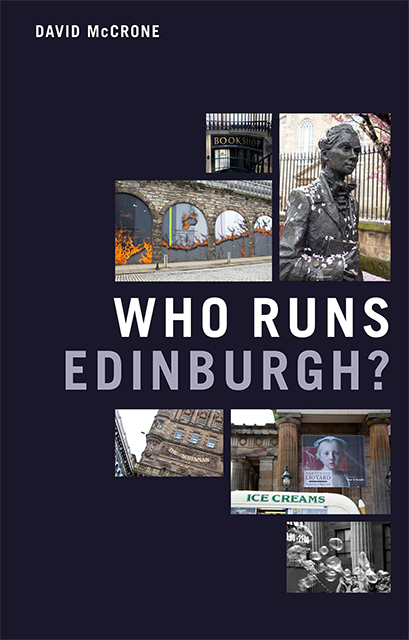Book contents
- Frontmatter
- List of Contents
- Figures and Tables
- Preface
- 1 Who Runs Edinburgh?
- 2 Politics in Edinburgh
- 3 Winners and Losers: The Political Economy of Edinburgh
- 4 Treading Angels: Edinburgh and its Festivals
- 5 Are You One of Us? Status in the City
- 6 What School did You Go To? Education and Status in Edinburgh
- 7 Enlightened City: Cultural Power and University Life
- 8 Developing Edinburgh: Pies in the Sky, Holes in the Ground
- 9 Lost in Leith: Accounting for Edinburgh’s Trams
- 10 Does Anyone Really Run Edinburgh?
- Bibliography
- Index
6 - What School did You Go To? Education and Status in Edinburgh
Published online by Cambridge University Press: 25 October 2023
- Frontmatter
- List of Contents
- Figures and Tables
- Preface
- 1 Who Runs Edinburgh?
- 2 Politics in Edinburgh
- 3 Winners and Losers: The Political Economy of Edinburgh
- 4 Treading Angels: Edinburgh and its Festivals
- 5 Are You One of Us? Status in the City
- 6 What School did You Go To? Education and Status in Edinburgh
- 7 Enlightened City: Cultural Power and University Life
- 8 Developing Edinburgh: Pies in the Sky, Holes in the Ground
- 9 Lost in Leith: Accounting for Edinburgh’s Trams
- 10 Does Anyone Really Run Edinburgh?
- Bibliography
- Index
Summary
Take part in any social occasion in Edinburgh, and sooner or later someone will ask you this question. The same one is asked in the west of Scotland –but that is about religion –which foot you kick with, is the cruder version. In Edinburgh, this is a question about social class, or more precisely, social status. It is a question not about what you earn, but about your connections and social networks, and possibly even your values. It seeks to place you in the scheme of things, the degree to which you are well-connected. If you reply, like this author, that you were not educated in Edinburgh, then the question is quickly judged to be irrelevant. It is really about being educated in the city and where you fit in socially.
Why should it matter so much? Because around one-fifth of secondary school pupils in Edinburgh attend ‘private’ schools, a much higher percentage than other Scottish cities. How we describe such schools is a vexed question (hence the quotation marks around ‘private’). Perhaps the most common epithet is ‘Independent’ schools, in juxtaposition to ‘public’ schools, but arguably neither of those terms is helpful. Because such schools have charitable status, they are able to offset costs against tax –a bone of political contention –and, one might aver, they are as a consequence not truly ‘Independent’. The term also implies that other schools are ‘dependent’ (on state funding). Then there is the distinction between ‘public’ and ‘private’ schools, but that distinction is bedevilled by its misuse in England, where ‘public’ means no such thing. In any case, in Scotland ‘public school’ is literally etched in to the stonework of many primary schools to render a nonsense such a descriptor for what are in essence ‘private’ schools. The preference in this article is for ‘fee-paying’ which has the merit of being a categorical term, at least since the mid-1970s when ‘grant-aided’ schools were abolished; to be discussed later. On the other side, the term ‘education authority’ schools has the merit of being self-descriptive in terms of how they are governed –by the local authority. So throughout this chapter, the terms ‘fee-paying’ and ‘education authority’ are preferred.
- Type
- Chapter
- Information
- Who Runs Edinburgh? , pp. 140 - 167Publisher: Edinburgh University PressPrint publication year: 2022

